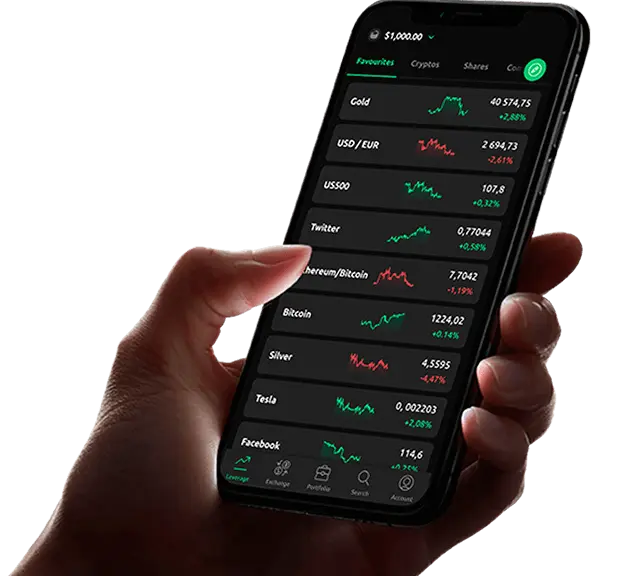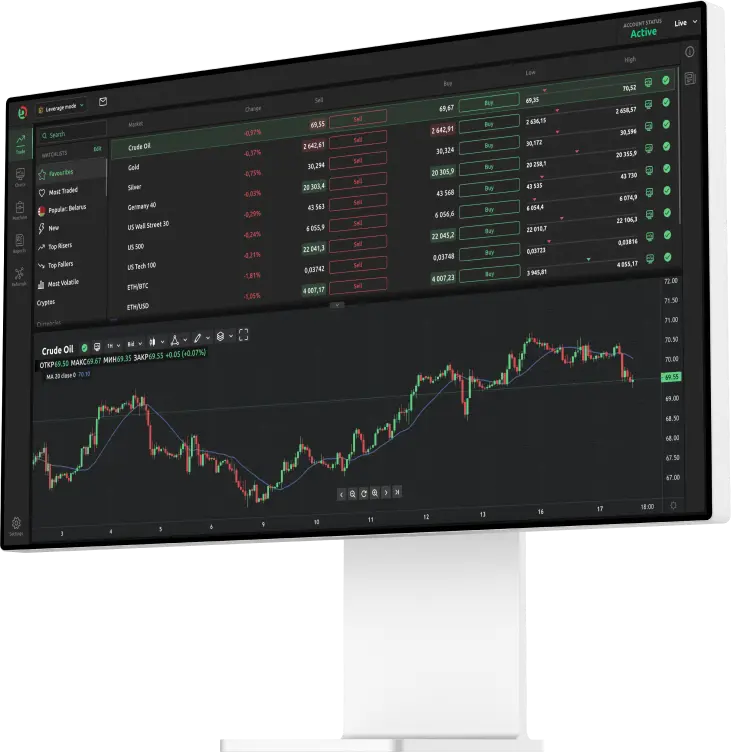Trading ETH to EUR
ETH to EUR, or Ethereum to Euro, is a pair made up of one of the popular cryptocurrencies and the official currency of Eurozone. The Ethereum to EUR pair may be very attractive for traders because each element provides a good level of liquidity and volatility.
On an hourly time frame, the price of the pair may move more than five per cent, sometimes even more than 10 per cent, if certain events or announcements occur. The daily fluctuations of the Ethereum to Euro (ETH/EUR) value may be more than 15 per cent in either direction, which indicates that traders have the opportunity to make significant gains in a short period. Also, the pair has the potential to fluctuate more than 30 per cent in a single month.
What is Ethereum?
Ethereum was introduced in 2015 by a Russian-Canadian programmer Vitaly ‘Vitalik’ Buterin. It is an open-source platform that utilises blockchain technology to create and execute distributed applications (DApps). Users can create or join so-called ‘smart contracts’ directly without third parties, limiting the possibility for fraud.
Ethereum is commonly used as a name of the associated cryptocurrency, but in fact, Ethereum is the system or network while Ether or ETH is the native currency. Users need to have Ether when they want to execute a certain transaction through the system.
Some interesting facts about ETH:
- - The Ethereum project was successfully crowdfunded in the middle of 2014 when it raised more than $18m.
- - At the end of 2015, Ethereum’s price was slightly below $1. By mid-May 2021, it reached an all-time high of $4,362.
- - Unlike some other cryptocurrencies, there is no maximum supply cap for Ether.
- - Ether can be created through ‘mining’ – users receive a reward when they complete a mathematical task and verify transactions.
- - The Ethereum Alliance (EEA) is an organisation developed to enhance the future usability of Ethereum.
- - Most of the ICO (Initial Coin Offerings) are hosted on the Ethereum blockchain.
What affects Ethereum’s value?
The factors can be divided into two groups – the ETH related and those affecting the general cryptocurrency market.
Ethereum-specific factors are:
- - The demand for ETH, which is not driven solely by trading activities.
- - The acceptance of the Ethereum system by more established financial institutions.
- - The increased adoption of smart contracts hosted on the Ethereum platform and the inflow of new users will increase the demand for ETH.
- - The degree of mining profitability.
- - Improvements in the Ethereum system in the future.
General factors related to the crypto world:
- - Changes in regulatory laws and regulations regarding the legality and usage of cryptocurrencies.
- - Potential market manipulation by large participants or so-called crypto whales.
- - Speculative trading – on 22 June 2017, a multi-million-dollar market sell order crashed the ETH price from above $300 down to $0.10 in a couple of seconds. Although, the price did bounce back within minutes. One trader reportedly made over $1m, thanks to an automatic buy order set at $0.10 through which he purchased more than 3,000 ETH.
- - The number of crypto channels where ETH is available for trading also affect its value.
- - The number and strength of ETH competitors.
What is the Euro?
Officially introduced in 1999 (in 2002 it was introduced in its physical form), the Euro or EUR is the official currency of 19 countries that are part of the European Monetary Union (EMU) and the European Union (EU). The group of countries that use the EUR as their official currency is also known as the Eurozone. There are also countries which are not part of the EU or EMU but, for one reason or another, use the EUR as their official currency (Monaco, Montenegro, San Marino, etc). The EUR is one of the most popular currencies in the world and the second-most-traded currency after the US dollar.
Which factors affect the Euro value?
As an official currency of the EMU countries, any adverse or positive changes in the EU economy or the economies of individual countries can result in changes in the EUR exchange rate. Employment rates and job creation can also affect the EUR. Moreover, traders should closely track the monetary policy, which is managed by the European Central Bank (ECB) and watch the economic news release calendar.
Fluctuations in EUR value are also under the influence of the national debt of individual countries as well as their budget deficit. Also, political events and international agreements may drive the value of EUR.
Why trade ETH to EUR with Dzengi.com
- Advanced charts and tools
Access to 70+ technical indicators and analysis tools, powerful charts, real-time price alerts and notifications.
- Crypto to cash – seamlessly
Fund your account and withdraw fiat with your credit card, bank transfer or a crypto wallet.
- Do more with less
Stop paying more to trade ETH. Start with as little as 0.002 ETH and enjoy the power of 100x leverage.
- Smooth trading experience
Instantly buy tokenised assets with Ethereum and at competitive prices. Store your holdings safe and transfer with ease.
- Negative balance protection
Manage your risk with guaranteed stop-loss and take-profit orders. Never lose more than you put in.





